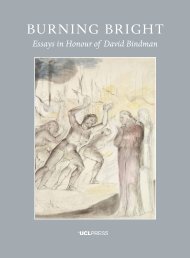Archives
TiL0x
TiL0x
You also want an ePaper? Increase the reach of your titles
YUMPU automatically turns print PDFs into web optimized ePapers that Google loves.
supreme in our society, there will be no stories left to tell, no<br />
images for history to evoke. 32<br />
Earlier I quoted Huizinga’s comment on ‘fair play’ as defining a civilised<br />
community’s game-playing: ‘True civilization will always demand fair<br />
play. Fair play is nothing less than good faith expressed in play terms.<br />
Hence the cheat or the spoil-sport shatters civilization itself.’<br />
When Huizinga wrote this, National Socialism was on the rise,<br />
and the shadow of ‘spoil-sports’ cast across Europe was a long one.<br />
According to Huizinga, absolutist regimes produce fixed, inflexible rules<br />
to which communities are forced to adhere, at the same time as they<br />
‘spoil’ (by suppressing improvisation, individualism and play) the richly<br />
generative, life-affirming games of others.<br />
My point here is not that we should dwell on the particular<br />
conditions of Huizinga’s development of his idea of play as<br />
fundamental to understanding the human condition. It is rather in<br />
order to point out that there is a strong affinity between Huizinga’s<br />
fervent plea for a humane narrative history, and the passion with<br />
which today historians and critics such as Natalie Zemon Davis and<br />
Stephen Greenblatt affirm the possibility of framing a better today by<br />
attending scrupulously to the textual and documentary residue of the<br />
past. Hence the urgency with which they state their purpose as critics<br />
and historians – more than a profession, more of an ethical quest. Here<br />
is Stephen Greenblatt:<br />
I wanted to find in the past real bodies and living voices, and if<br />
I knew that I could not find these . . . I could at least seize upon<br />
those traces that seemed to be close to actual experience. . . . I<br />
wanted to recover in my literary criticism a confident conviction<br />
of reality, without giving up the power of literature to sidestep or<br />
evade the quotidian and without giving up a minimally sophisticated<br />
understanding that any text depends upon the absence of<br />
the bodies and voices that it represents. I wanted the touch of the<br />
real in the way that in an earlier period people wanted the touch<br />
of the transcendent. 33<br />
And here, finally, is Natalie Davis, narrating her investment in past voices<br />
as guiding lights for strong moral values in our present and future:<br />
32 Huizinga, ‘History changing form’, Journal of the History of Ideas 4 (1943), 217–223: 223.<br />
33 Stephen Greenblatt, ‘The touch of the real’, Representations 59 (1997), special issue, ‘The<br />
fate of “Culture”: Geertz and beyond’, 1997, 14–29; 21–2.<br />
The Afterlife of Homo Ludens 99





